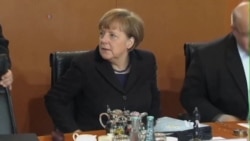Germany, Europe’s economic behemoth, has never been as prosperous, secure and free as it is today. It is the world’s fourth largest economy and one of the world’s top exporters.
Twenty-four years after its reunification, Germany has become America’s most valuable European partner, says Annette Heuser, executive director and founder of the Bertelsmann Foundation, the Washington-based arm of a German-based organization promoting trans-Atlantic ties.
Heuser repeated a question attributed to Henry Kissinger, the German-born former U.S. secretary of state, about which country served as the locus of European power.
"'What is Europe’s phone number?' I think we can give Henry Kissinger a very solid answer now. The number is in Berlin," Heuser said.
Reluctant leader?
Despite its growing influence, Germany has been reluctant to take the lead in larger global affairs, said Stephen Szabo, a scholar of U.S.-European relations and author of the book "Germany, Russia and the Rise of Geo-Economics."
"The whole idea is that [Germany is] an economic power, not a military or strategic power," said Szabo, executive director of the Transatlantic Academy research institute funded in part by the German Marshall Fund.
"Will Germany stop being a big trading state concerned only about trading, or will it now begin to rebalance and have a real foreign policy, not just an economic policy?" Szabo asked.
He acknowledged that Germany’s road to great power status is strewn with obstacles. The 2009 Eurozone debt crisis has been managed on Berlin’s terms, but five years of wrenching austerity measures shifted Europe's political landscape by giving rise to left-wing radicals and right-wing populists.
Their sole common ground is resistance to Germany’s solutions, Szabo said.
"I think there has been certain arrogance: 'We have the right way – you should just follow our way,'" he said of German leaders. "This is something that they will have to address."
Germany’s rise is occurring as the West confronts Russia over Ukraine and tries to stem security risks emanating from Islamic extremism, said Daniel Hamilton, director of Johns Hopkins University’s SAIS Center for Transatlantic Relations.
"All the turbulence associated with Russia, and the whole turbulence in the Middle East, could intersect at some point and affect Europe per se," Hamilton said. "All of this can replay back into Western Europe either in flows of people or flows of all kinds of nasty things affecting core Europe."
Stepped-up security
The crisis on Europe’s doorstep has led Berlin to step up its security presence.
Reinhard Bütikofer of the German Council on Foreign Relations said the German military is playing a major role in NATO's new rapid response force created in reaction to Russia's moves in Ukraine.
"And the Germans, who are never eager to get involved militarily, have put troops into some of the Baltic countries, helping countries that have weak military defenses of their own," Bütikofer said.
Ending another post-World War II taboo, Berlin is providing arms to Iraqi Kurdish forces battling Islamic State fighters.
Experts say Germany’s global economic reach depends on the stability of an international political order underpinned by Western strategic power, to which it is now contributing readily.





